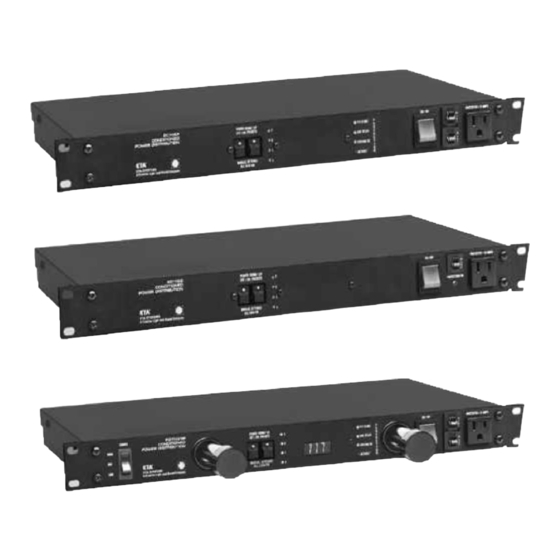ETA Systems PD11SP 소유자 매뉴얼 - 페이지 7
{카테고리_이름} ETA Systems PD11SP에 대한 소유자 매뉴얼을 온라인으로 검색하거나 PDF를 다운로드하세요. ETA Systems PD11SP 13 페이지. Conditioned power distribution sequential power up / power down
ETA Systems PD11SP에 대해서도 마찬가지입니다: 소유자 매뉴얼 (8 페이지), 사양 시트 (2 페이지)

Three-Wire Remote Control Interface
A three-wire remote control interface is added to the main PC board for the PD11SS, PD11SP AND
PD11LVSP units. This remote control interface is accessible through an external terminal block on the back of the
unit (see Figure 6). This interface requires an external user provided switch, L.E.D., and a three-wire cable to imple-
ment. The interface has been tested reliably over 1000 feet with 22-gauge speaker wire (see Figures 1 and 5).
Connect the short minus (-) lead of the L.E.D. and one side of the switch to the COMMON terminal, the
long plus (+) lead of the L.E.D. to the L.E.D. terminal, and finally the other side of the switch to the ON/OFF termi-
nal. When you close the switch, the L.E.D. will begin flashing until all channels have sequenced ON, and then the
L.E.D. will remain ON. When you open the switch the L.E.D. will begin flashing until all channels have sequenced
OFF and then the L.E.D. will remain OFF.
Remote Relay Function Operation (optional)
Using a set of relay contacts that are normally open instead of a switch you can control the PD11SS,
PD11SP AND PD11LVSP units with a relay. When you apply power to the relay the channels will sequence ON, and
when you disconnect power from the relay the channels will sequence OFF. This allows you to interface a PD11SS,
PD11SP AND PD11LVSP unit with other equipment that has dry (normally open) relay contacts (see Figure 2).
Larger Installations In a larger installation, you can control different equipment racks from a remote location by
running three-wire cable from each rack back to the remote location. Then attach an L.E.D. and switch as
before, these would be mounted in the user's control panel, and you now have remote control of each rack in a sin-
gle location (see Figure 3).
